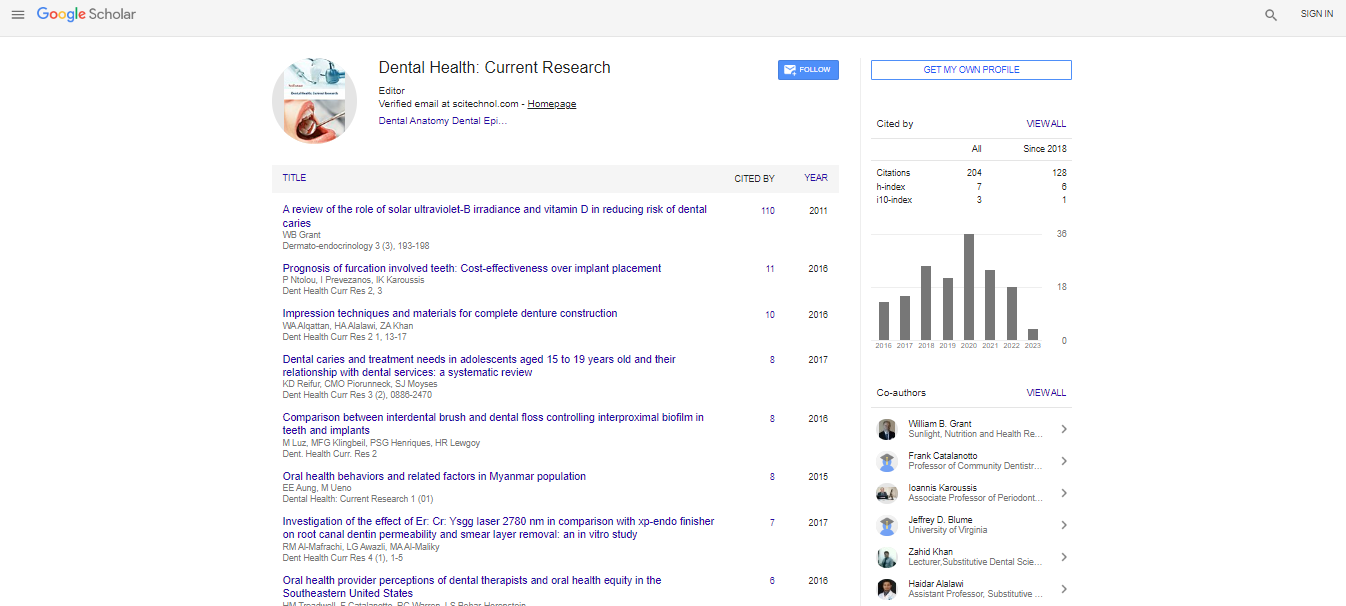Case report of a patient with Clostridium tetani in the University Hospital Center "Mother Teresa", Tirana, Albania
Mimoza Canga* and Irene Malagnino
University "Ismail Qemali", Albania
Malagnino Associated Medical Clinic, Italy
: Dent Health Curr Res
Abstract
Background: Bacteria of the genus Clostridium tetani are gram-positive obligate anaerobes. Infection is common in epidermal wounds, surgical procedures, insect bites, dental infections, compound fractures, chronic infections, and intravenous drug abuse. Objective: The objective of this study was to evaluate tetanus as an acute disease of the central nervous system, caused by the toxin of the bacterium clostridium tetani, in a patient treated in University Hospital Center "Mother Teresa", Tirana, Albania. Materials and Methods: This study was conducted in the University Hospital Center "Mother Teresa", Tirana, Albania in 2021. The 61-year-old patient came to the hospital with symptoms of spastic paralyzes, Masseter muscle trismus, rapid pulse, fever, painful muscles, and stiffness of abdominal and back muscles. Trismus and spasms began gradually and then progressively spread from the neck to the inferior extremities. Moreover, the patient had a stiff neck and had hardness opening the mouth. In the acceptance, the body temperature was 39°C. The present study was done based on protocols. Results: In this study, we can confirm that the patient is tested for acute bacterial meningitis and rabies virus. The cultures were taken from the blood and cerebrospinal fluid, and the sensitivity test resulted in a negative. Moreover, the fluorescent antibody test was used. Isolated cultures tested for meningitis and rabies were identified by their morphology using their biochemical properties. The patient found it impossible to open his mouth for two whole days and the medical personnel was not able to find the pathogen responsible for the critical situation in which the patient found himself. Thirty-six hours later the patient went into a comatose state and twelve hours later he died because of cardiac arrest. According to the autopsy, it was concluded that the cause of death of the patient was clostridium tetani. Conclusion: In essence, considering the findings obtained by the current study conducted in the University Hospital Center "Mother Teresa", Tirana, Albania, it is confirmed that the treatment of infectious diseases is getting harder and harder, especially for the infections caused by clostridium tetani.Keywords: Clostridium tetani, Death, Fever, Masseter muscle trissmus, Painful muscles. Importance of Research: Good knowledge of the impacts of tetanospasmin is crucial in order to prevent mortality from Clostridium tetani.
Biography
Mimoza Canga is laureate of the Faculty of Medicine and Dentistry of Sapienza, University of Rome, Italy, in the years 2000-2006. She completed her PhD at the University of Medicine in Tirana, Albania. In 2022 she received the title of Associate Professor at the University of Medicine in Tirana, Albania. She has been working as a lecturer in the University of Vlora, Department of Public Health, since 2009. She has published 26 papers and 14 abstracts in reputed journals. Irene Malagnino graduated with honors in Dentistry and Dental Prosthetics from the University of "L'Aquila". She specialized with honors in Orthodontics at the Sapienza University of Rome. She is the author of 15 publications in national and international journals.
 Spanish
Spanish  Chinese
Chinese  Russian
Russian  German
German  French
French  Japanese
Japanese  Portuguese
Portuguese  Hindi
Hindi 